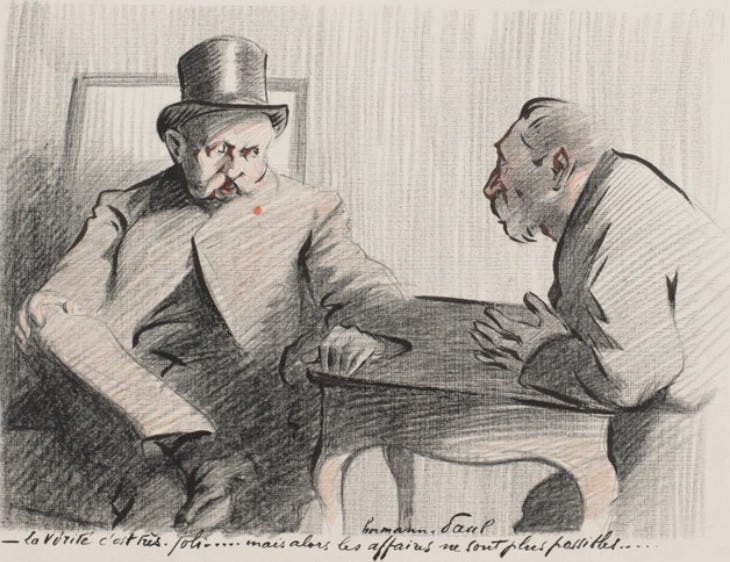Review: Dessiner pour la justice. Hermann-Paul et l'Affaire Dreyfus (1897-1899). Musée d’Orsay, Paris, Cabinet d'Arts Graphiques; Niveau 5, Salle 41. March 25 to October 2025. https://www.musee-orsay.fr/fr/agenda/expositions/les-createurs-et-laffaire-dreyfus
Here we have a very small exhibition—it occupies one room—devoted, on appearance, to a minor artist, “Hermann-Paul” (René Georges Hermann Paul) a prolific illustrator for anarchist journals at the turn of the 20th century.
Nevertheless, it packs a huge emotional punch and a lesson for our times.
Anonymous. Public degradation ceremony of Captain Dreyfus at the Military Academy, January 5, 1895. Silver bromide photograph. Video capture, July 13, 2025.
It’s superfluous to remind ourselves of the Dreyfus Affair in its broad outlines. It’s good to be reminded that the stakes went far beyond the guilt or innocence of a lone Jewish officer accused of treason. The Affair involved an anti-Dreyfus faction desperate to protect at all costs the facade of legitimacy that defined the State—a facade built on the fantasy of the integrity of its institutions, in particular the Army; while on the opposing side, as the signage explains without a trace of self-consciousness,
« Les artistes dreyfusards luttèrent à rappeler la force des valeurs universalistes de la République que piétinaient leurs adversaires. »
“Dreyfusard artists fought to restore the power of the universalizing values of the Republic, which their adversaries were trampling underfoot.”
But as Hermann-Paul suggested, those were not the only values under siege:
Hermann-Paul. « La Vérité c’est très joli… mais alors les affaires ne sont plus possibles. » Drawing for Le Cri de Paris, June 3, 1900. Ink, graphite and color pencils on treated white paper. Musée d’Orsay, Paris.
Two capitalists sit disconsolately at a table, sounding for all the world like a Fox News take on Zohran Mandami: “Truth is all very well... but then business is no longer possible.”
Hermann-Paul begs to ask, whether there was that much Truth to the Truth as defended by the pro-Dreyfus crowd. Then as nowadays even in France, the insular set of values and beliefs promoted by bourgeois Republicanism was far less universal than its defenders wished to believe. To defenders of Bourgeois liberalism like Anatole France, the fact that Dreyfus was a Jew was an annoying distraction from the universalist message; likewise, Hermann-Paul would eventually join the ranks of Fascist hyper-nationalism. Legitimacy would have to rest on something deeper than Republican ideology or anarchist boilerplate, and this is the need that Art Nouveau attempted to meet in the person of the great glassmaker Émile Gallé:
Victor Prouvé. Portrait of Émile Gallé. Oil on canvas, 1892. Musée de l'école de Nancy.
Gallé, who ardently supported the Dreyfusard cause, attempted to integrate his political beliefs with his artistic practice by suggesting that the tendrils and organic forms of Art Nouveau constituted a return to a natural Truth beyond ideology, in line with the traditions of Utopian Socialism that suggest that sharing, and a will to happiness, are expressions of natural needs, pace Eric Adams. Gallé saw the glassmaker’s fire as a purifying process, a return to originary elements, and processes, and values.
No event can have been more dedicated to the proposition that the values of France were universal, than the Universal Exhibition of 1900; no style was more closely associated with the promotion of those values than Art Nouveau, whose apotheosis and collapse closely correspond with the Exhibition. There, Gallé displayed a set of glassware that were meant to evoke Justice, Truth, Reason and Light in a stand conceived as a four vengeur, an avenging furnace crowned with an inscription from Hesiod:
« Mais si tous les hommes sont méchants, faussaires et prévaricateurs À moi les mauvais démons du feu : Éclatent les vases ! Croule four ! Afin que tous apprennent à pratiquer la Justice. »
But if all men are wicked, falsifiers, prevaricators Come to me, evil demons of fire: Shatter the vessels! Furnace, crumble! That all may learn to practice Justice.
Nature, says Sartre, is the word for all that escapes the Bourgeois order of things. Whether it’s the imaginary order of human solidarity, or the imaginary order of Art.
Hey, it’s a start.
WOID XXIV-50
July 14, 2025





